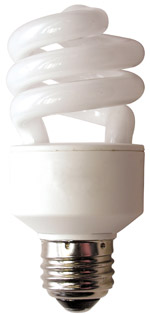Compact fluorescent lamps
 There is an easy and affordable way to do both – simply change out traditional incandescent light bulbs for compact fluorescent lamps (CFLs).
There is an easy and affordable way to do both – simply change out traditional incandescent light bulbs for compact fluorescent lamps (CFLs).
CFLs use about 75 percent less energy than standard incandescent bulbs and can last up to 10 times longer. You can save $30 or more in electricity costs over the lifetime of each CFL you install. Better still, CFLs produce 75 percent less heat than standard incandescent bulbs, so they are safer to operate and can reduce energy costs for cooling your home.
Safe handling and disposal of CFLs
CFLs use a very small amount of mercury, so it is important to handle and recycle CFLs properly. On average, each CFL contains about 5 milligrams of mercury – about the amount that would cover the tip of a ballpoint pen. To put that amount of mercury into perspective, a typical mercury-filled thermometer contains about 500 milligrams – or 100 times more mercury than in a CFL.
Like standard light bulbs, CFLs are made of glass, so they should be handled with care and will break if dropped or treated roughly.
Volusia County’s Solid Waste Division recommends that you follow these steps for the safe clean-up and disposal of broken CFLs:
- Ventilate the room. Open a window and keep everyone out of the room for at least 30 minutes. If available, point a floor or pedestal fan at the open window. A ceiling fan will provide some benefit but will not move the air out of the room.
- Pick up all the materials you can and be sure to wear disposable gloves. Do not use a vacuum cleaner. Carefully scoop up the fragments and powder with stiff paper or cardboard. Use sticky tape to pick up small pieces. Wipe the area with a damp disposable towel.
- Double bag and recycle. Place the broken CFL and clean-up materials in double plastic bags and seal the bags.
- Wash your hands thoroughly.
- Take the materials to the household hazardous waste sites at:
- Tomoka Landfill, 1990 Tomoka Farms Road, Port Orange
- West Volusia Transfer Station, 3151 E. New York Ave., DeLand
Burned-out CFLs also should be recycled at the household hazardous waste sites.

